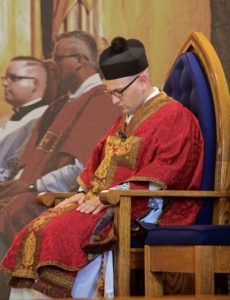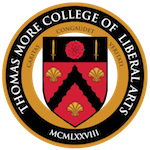Words of Encouragement from Thomas More College Chaplain Fr. Jeff Paveglio
 What does a “normal” day in self-isolation look like for you as a diocesan priest? What are the greatest challenges and opportunities the current pandemic has presented?
What does a “normal” day in self-isolation look like for you as a diocesan priest? What are the greatest challenges and opportunities the current pandemic has presented?
Father: Basically, my schedule is not all that different from what it normally is. I get up, pray, have my Holy Hour, celebrate Mass (we are doing a livestream Mass at 7:00am on weekdays from the Cathedral of St. Joseph). I’m trying to keep as “normal” of a schedule as I can, so that I don’t end up getting derailed by the present situation. I’m still hearing Confessions at the Cathedral every day. I’m still doing individual spiritual direction. I, like everyone else, have a little extra time for prayer. Especially this week, I will devote time to liturgical texts that I’m not able to celebrate in the same way I normally would.
One of the most challenging things is just seeing how difficult this is for a lot of the faithful, who are really longing and hungering and thirsting for the Eucharist, who are missing mass. That’s really heartbreaking, but it’s also really encouraging to see that desire.
One good thing that may come out of this is that we have to deal with ourselves. There’s a lot of time in silence. And spending that time in silence forces you to deal with your own “stuff.” The distraction of our normal day-to-day schedules can often be a crutch. Forced isolation provides a real opportunity to confront some of those issues we have. Bad habits are only going to be made more clear. Our need for God’s mercy becomes more clear.
As you know, so much of a Thomas More education and formation is rooted in physical community—students studying together, worshipping together, making music together. Do you have any suggestions for ways to maintain bonds of friendship and spiritual communion given the current limitations?
Father: I think praying for each other is really important. Being deliberate about it, too. I would encourage students to write out the names of all their classmates and professors, and to pray for them by name. I have a devotion to St. Joseph; being at the Cathedral of St. Joseph in Manchester has only enhanced that devotion. I have a statue of sleeping St. Joseph that Fr. Jason Jalbert gave me. I put prayer intentions under that little statue. I suggest students and faculty do something similar in their own homes.
We have to be more intentional about our friendships right now—especially those few, particular, intimate friendships—since we are physically separated. Everyone needs to at least maintain contact with their close circle of friends. Some have lots, some have smaller circles. But there is that philia that is so important to have right now. I suppose one of the benefits of technology is that we can talk by voice and video. I would encourage students who can to read together, to study together via these means. If there are other students within fairly close proximity, while still maintaining prudent distancing measures, a few students could meet up at a park or go for a walk. But really, I think that praying for each other and maintaining some form of contact is essential.
Students and faculty want to serve, especially during this time of great suffering and need. What opportunities do you see for corporal and spiritual works of mercy in this present situation?
Father: Corporal works of mercy are obviously restricted, but some can be modified. The physical visit is obviously a more powerful thing. But even calling or face-timing can be a way of making as close as possible a human connection with family members or neighbors who are alone.
Feeding the hungry is especially needed right now. A lot of food banks and services that people really depend on right now are not operating as normal. If you’re able to give to a food bank, that’s especially critical right now.
But spiritual works of mercy are things we can do without that physical presence. Especially counseling the doubtful—we can provide that counsel and comfort to people who may really be struggling with their faith right now, struggling with faith in the Church, struggling with feelings of abandonment. We can certainly pray for the living and the dead and comfort the afflicted. Obviously, praying the rosary is one of the best ways to do that. Praying the Divine Office or praying with the texts of the Holy Mass, with the different liturgical celebrations of Holy Week, of the Triduum especially, will allow us to assist those especially those in need of our prayers: the sick, the dying, the lonely, especially the elderly who are really isolated more than most now.
As we live through this pandemic and move through Holy Week and into the Easter Season, are there any particular prayers, devotions, or readings you recommend?
Father: The Prayer in time of Epidemics is just a really great prayer. It’s particularly helpful, because a lot of prayers we are seeing right now are much more focused on bringing an end to the pandemic, rather than on the need for repentance. We need to remember that this is really an opportunity for us to repent and turn away from sin.
It’s good to recall what Chesterton says in answer to “What’s wrong with the world?” He says: “I am.” Maybe we’re not worshipping false idols or engaging in some of those evils that we as a society especially need to repent of, like abortion. But our own sinfulness wounds Christ.
Normally, God extends His protecting hand over us; in this moment, he has removed that. In the Prayer in Time of Epidemics we pray for the compassion of God, that He be moved to pity, that he heal the wounds of our body and soul, that he “hear our petition so that mortal hearts may recognize that these scourges proceed from Thy indignation.”
Another powerful prayer is the Stella coeli, a Marian prayer to Our Lady, the Star of Heaven. In this prayer, we recognize the reasons that this pestilence has come upon us, but we plead for mercy.
The prayers of the Votive Mass in Time of Pestilence are also quite powerful, particularly the Scriptural readings they are rooted in. “God willeth not the death of the sinner,” the Gradual reminds us. The prayers are not without hope. They call us to repentance, but with hope. Reading such prayers, particularly during this Holy Week, can help us really enter into the Passion of Our Lord in a deeper way.
There’s a strong temptation right now to disappointment, anxiety, and fear. Many in our community in the coming days may experience the illness or loss of a loved one. How can students reclaim Easter Joy in the midst of these difficulties?
Father: We can all unite ourselves with persecuted Catholics throughout the world, and reflect on the great gifts we have been given, even as they are temporarily removed from us. In Bishop Athanasius Schneider’s book Dominus Est (“It is the Lord”), Reflections of a Bishop in Central Asia, he recounts his experience as a child in former Soviet bloc countries. They were lucky if they got Mass once a year. His first Holy Communion was at a clandestine mass. We can really empathize with those Christians right now, and unite our somewhat comparatively minor suffering with theirs.
We can also look to some of those saints in times of plague: St. Charles Borromeo, who dealt with the plague in Milan shortly after he became archbishop; St. Gregory the Great, whose predecessor Pope Pelagius had succumbed to the plague. St. Gregory ordered processions to end the plague. There were people literally dying in the procession. Just before this penitential procession through the streets of Rome crossed the bridge to what is now the Castel San Angelo, the Holy Father saw angels gathering around the people, singing the Regina Caeli. St. Michael appeared, wiped his bloody sword, and sheathed it, indicating the end of the pestilence.
In the midst of this very dark moment, the people processed, they petitioned God, and He heard; He gave us the Regina Caeli. For us, too, despite all this difficulty, we can still rejoice in the victory won for us on the Cross.
Regina caeli laetare, alleluia:
Quia quem meruisti portare, alleluia:
Resurrexit, sicut dixit, alleluia:
Ora pro nobis Deum, alleluia.Queen of Heaven, rejoice, alleluia.
For He whom thou wast worthy to bear, alleluia.
Hath risen, as He said, alleluia.
Pray for us to God, alleluia.
>>For COVID-19 Updates, Resources, and Reports

Fr. Jeffrey Paveglio currently serves as Associate Pastor for the St. Joseph’s Cathedral Parish in Manchester, NH. He regularly joins the Thomas More College community to celebrate Mass.
Fr. Paveglio attended Univeristy of New Hampshire from 2003-2007, graduating with a BA in Political Science, and was commissioned in the NH Army National Guard as a Second Lieutenant. He attended Saint Mary’s Seminary and University in Baltimore, MD from 2007-2014, graduating with an M.Div., MA in Theology, and an STB.
Fr. Jeff was ordained to the priesthood in 2014. Fr. Jeff has held numerous assignments in NH, while also serving as a Military Chaplain, including a deployment to the Middle East as Chaplain of the 197th Field Artillery Brigade in support of Operations Spartan Shield and Operation Inherent Resolve.
